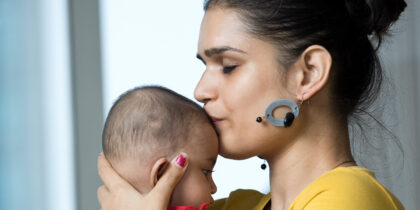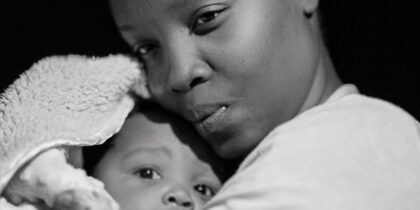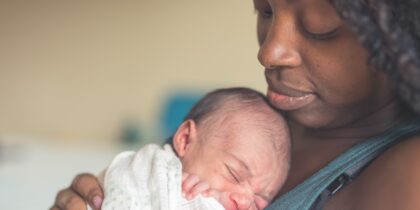A couple of years ago, I wrote about the intersection of racial inequality and maternal mental health, sharing my personal journey and the systemic issues faced by Black mothers in the UK. Today, as a mother of three, with my youngest now seven months old, I reflect on what has changed and what still needs our attention.
Personal growth and continued systemic challenges
My journey into motherhood for the third time has been a testament to personal growth and preparedness. This time around, I felt more equipped to handle the challenges that come with a newborn. However, the stories I’ve heard from countless mothers through The Motherhood Group reveal that the systemic issues I faced with my first two children, now eight and six years old, still persist for many Black mothers.
Despite my years of campaigning and advocacy work, the lack of personalised care and the feeling of being unseen in the health care system remain prevalent issues. As one mother recently shared with me, “I felt like a number, not a person. My concerns were brushed aside, just like you described years ago”. This reinforces the critical need for continued advocacy and systemic change.
Updated data and persistent inequalities
Recent data paints a sobering picture of the challenges we still face. It breaks my heart to learn that babies of Black ethnicity are still more than twice as likely to be stillborn than babies of white ethnicity. The thought of so many Black mothers experiencing this profound loss is deeply distressing. Even after birth, our babies face higher risks, with neonatal mortality rates for Black babies significantly higher than for white babies.
These stark disparities in birth outcomes are just the tip of the iceberg. The mental health toll on women of colour is equally concerning. We’re more likely to experience mental health problems and face various psychosocial risk factors, yet we’re less likely to receive proper diagnosis or treatment for perinatal mental illness. This gap in care is not just a statistic – it represents countless women suffering in silence, their pain unacknowledged and untreated.
What’s particularly frustrating is the apparent step backward in access to care. Recent data suggests a decrease in referrals to specialist perinatal mental health services, potentially affecting women of colour disproportionately. This decline in support comes at a time when we need it most, leaving many of us feeling abandoned by the very systems meant to support us.
These realities weigh heavily on me. As one mother in our support group put it, “It feels like we’re fighting the same battles, just with newer numbers”. This sentiment echoes through many of our community discussions, highlighting the emotional toll of these persistent inequalities. It’s exhausting to see the same issues arise year after year, with only marginal improvements.
The Motherhood Group: Expanding our reach
In response to these ongoing challenges, The Motherhood Group has redoubled its efforts:
- Black Maternal Health Conference: We launched our inaugural Black Maternal Health Conference, bringing together health care professionals, policymakers, community leaders, and mothers. This conference has become a crucial platform for discussing challenges, sharing best practices, and formulating actionable strategies to improve Black maternal health outcomes.
- Joined-up approach: We’ve taken a more collaborative approach, engaging with various stakeholders including NHS trusts, charitable organisations, and MPs. This has allowed us to advocate for policy changes and improved practices at a systemic level.
- Enhanced support programmes: We’ve expanded our peer support programmes and workshops, now offering specialised sessions on antenatal preparation, postpartum recovery, and maternal mental health tailored specifically for Black mothers also digitally.
Societal changes and ongoing challenges
The past few years have seen increased awareness of racial disparities in health care, partly driven by global racial justice movements and the disproportionate impact of Covid-19 on racialised communities. This heightened awareness has led to:
- More research funding allocated to studying and addressing racial disparities in maternal health
- Increased media coverage of Black maternal health issues, helping to keep the conversation in the public eye
- Some NHS trusts implementing cultural competency training for maternity staff.
However, challenges persist:
- The implementation of changes remains inconsistent across different regions and health care providers
- Systemic racism and unconscious bias continue to affect the quality of care received by Black mothers
- The economic impacts of recent global events have disproportionately affected racialised communities, potentially exacerbating health inequalities.
Looking forward
As we move forward, it’s crucial that we maintain momentum in addressing these disparities. The joined-up approach we’ve adopted through The Motherhood Group’s initiatives is a step in the right direction, but there’s still much work to be done.
We need:
- Continued investment in culturally competent mental health services for Black mothers.
- Mandatory training for all health care professionals on racial bias and cultural sensitivity in maternal care.
- Increased representation of Black women in leadership positions within maternity and mental health services.
- Ongoing research into the specific mental health needs of Black mothers and effective interventions.
- Policy changes that address the social and economic factors contributing to maternal health disparities.
My personal journey, now as a mother of three, has only strengthened my resolve to fight for equality in maternal mental health care. The progress we’ve made is encouraging, but the persistence of these disparities reminds us that our work is far from over.
To all the Black mothers out there: your experiences matter, your voices are important, and you deserve equitable, respectful, and comprehensive care. Let’s continue to speak out, support each other, and push for the changes we need to see. As one resilient mother in our group said, “We’re not just fighting for ourselves, but for our daughters and their daughters. Every small win counts”.
Sandra Igwe is CEO and Founder of The Motherhood Group








